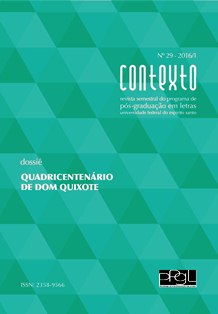A AMBIVALÊNCIA DO DUPLO PAPEL DO CENSURADOR INQUISITORIAL E DO CRÍTICO LITERÁRIO NO ESCRUTÍNIO DOS LIVROS DA BIBLIOTECA NO QUIXOTE
DOI:
https://doi.org/10.47456/contexto.v%25vi%25i.13318Abstract
O presente artigo tem como objetivo apresentar uma importante linha crítica de Don Quixote de la Mancha, a saber, a intenção do autor de acabar com a leitura, considerada nociva, da forma de livros de cavalaria na época, problematizando essa linha crítica, através da reflexão sobre a tensão presente no duplo papel do personagem Pero Pérez, padre censurador e leitor-crítico literário dos livros da biblioteca do Quixote, que aponta para a ambiguidade e a ironia, sempre constitutivas do texto cervantino. Mediante a análise interpretativa e crítica do texto literário, considerado paródia dos livros de cavalaria, cotejamos a posição de cervantistas como Américo Castro, Daniel Eisenberg, Mario Vargas Llosa e Octavio Paz para construir nosso argumento favorável à ambiguidade como solo precário, instável, que possibilita a postulação de afirmações mutuamente contraditórias como fundamento da Modernidade que o texto representa.
PALAVRAS-CHAVE: Quixote. Escrutínio da biblioteca. Ambiguidade. Inquisição. Modernidade.
The aim of this article is to present an important critical line of Don Quixote de la Mancha, that is, the author's intention of putting an end to the reading - considered to be noxious - of the genre at the time, questioning this critical line through the analysis of the present tension in the double role of the character Pero Pérez, a censor and literary critic-reader of the books in Quixote's library, which points to the ambiguity and irony, always elemental of the Cervantine text. Through a critic and an interpretative analysis of the literary text, considered to be a parody of chivalry books, we collate the perspective of Cervantines such as Américo Castro, Daniel Eisenberg, Mario Vargas Llosa and Octavio Paz to build our favourable argument of ambiguity as a precarious, unstable ground, that enables the postulation of mutually contradictory statements as the foundation of Modernity, which the text represents.
KEYWORDS: Quixote. Scrutiny of the library. Ambiguity. Inquisition. Modernity.
Downloads
Downloads
Published
Issue
Section
License

Este obra está licenciado com uma Licença Creative Commons Atribuição-NãoComercial 4.0 Internacional.





